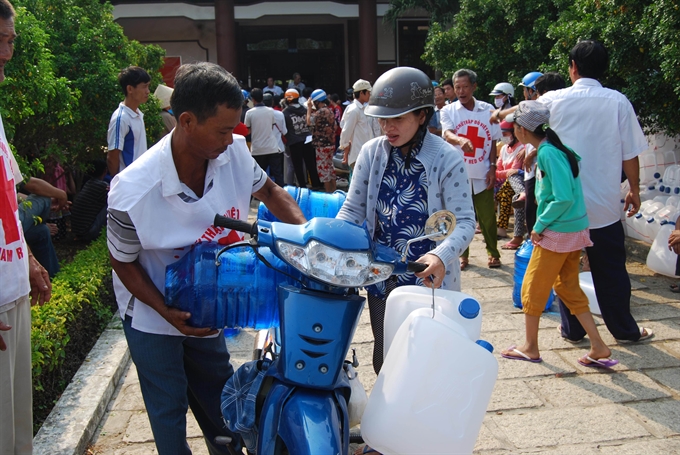 Society
Society

More than 400,000 people in the Cửu Long (Mekong) Delta province of Bến Tre are badly in need of water for household use, as the worst drought in 100 years continues in the delta
 |
| A Việt Nam Red Cross staff member helps a resident of Giồng Tôm Dictrict in southern Bến Tre Province to load water to take home. Last month, the Việt Nam Red Cross presented water containers to poor households seriously affected by saline intrusion in the district. — VNA/VNS Photo Văn Trí |
HCM CITY — More than 400,000 people in the Cửu Long (Mekong) Delta province of Bến Tre are badly in need of water for household use, as the worst drought in 100 years continues in the delta.
Most of the provinces in the delta have declared the situation a disaster and are in a state of emergency.
Phạm Thị Sắn, a resident of Ba Tri District’s An Hiệp Commune, said every year her family stored rainwater for use in the dry season, but due to a shortage of rainwater, they had been using salt water since March.
“My family even dug a well for water but the water is saline, which we cannot use. So we have to buy freshwater from outside the province at an extremely high price,” Sắn said.
Lê Văn Chiến, chairman of An Hiệp Commune’s People’s Committee, said: “There is no more fresh water. There is nothing in wells, either. Most people are dying for freshwater now. We badly need help.”
At coastal communes in the province, people have lacked fresh water since the beginning of the dry season, forcing them to buy water at unusually high prices (VNĐ80,000-150,000 (US$3.6-6.7) per cubic metre).
Many poor families cannot afford to buy fresh water, ending up using salt water for drinking and cooking.
Recently, around 3,000 tonnes of oysters in Thừa Đức Commune in Bình Đại District died en masse, which caused a loss of more than VNĐ40 billion ($1.79 million). The cause was attributed to the increasing level of salinity.
The drought and salinity also destroyed nearly 20,000 hectares of paddy rice and caused cattle to contract disease.
More than 6,000 hectares of grapefruit are also likely to be seriously affected by the disaster.
Although local authorities have built temporary dykes to prevent salinity, and have set up pump stations at the river’s upstream, the province still cannot cope with the disaster.
Timely assistance
Senior lieutenant-colonel Hà Đình Phượng, of Military Zone 9, said the zone had helped transport fresh water from the BOO Đồng Tâm water plant in Tiền Giang Province to the coastal residents in Ba Tri and Bình Đại districts, most of which were affected by drought.
The Việt Nam Red Cross has provided drinking water for 1,000 poor households (40 litres per household) at Lương Hoà, Lương Qưới and Phong Mỹ communes.
Nguyễn Thị Xuân Thu, chairwoman of the Việt Nam Red Cross, said the agency was running a campaign to help the Central and Central Highlands regions affected by the prolonged drought and salinity.
Most of the measures are temporary, as thousands of households in the province will need fresh water more badly in the coming time, she said.
In addition, in the south-central province of Bình Thuận, nearly 100,000 people lack fresh household water, mostly in Hàm Tân, Hàm Thuận Bắc, Bắc Bình and Tuy Phong districts.
In Hàm Tân District, 10 out of 10 communes with more than 40,000 people lack fresh water. They have to buy fresh water from Bà Rịa-Vũng Tàu Province.
The provincial committee has directed localities to give priority to supply of fresh water for people, cattle and crops.
The local authorities said the situation in the province would become even worse if there is no rain by the end of this month.
In a related issue, the international community on Monday committed to donate $1 million to help Việt Nam deal with the drought and saline intrusion.
Seven international non-governmental organisations and businesses vowed to provide clean water and food as soon as possible to the central, Central Highlands and Mekong Delta regions.
Drought and saltwater intrusion caused a severe water shortage and destroyed hundreds of thousands of hectares of crops in the three regions.
The damage is expected to worsen in the summer as the dry season reaches its peak. — VNS